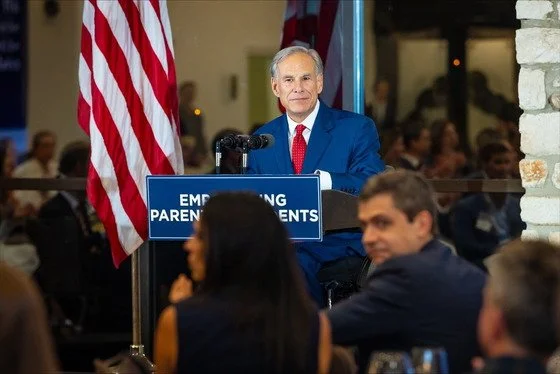Texas Gov. Abbott Receives Champion for Choice Award
Governor Greg Abbott last night accepted the John T. Walton Champion for Choice Award from the American Federation for Children in recognition of the Governor's leadership in delivering the largest day-one school choice program in America.
"This May, I signed into law the largest day-one school choice program in America, empowering parents, not bureaucrats, to decide what is best for their children," said Governor Abbott. "This historic legislation levels the playing field and expands educational opportunities for students across our great state. With this in full effect, Texas will become No. 1 in education and prove to the world the critical value of school choice."
This historic movement was driven by Texas families who want educational freedom for their children, including:
The Aly family, who watched their daughter fall behind during COVID and longed for a better option.
Eric Richerson, a father frustrated that his child's teacher refused to work with him to meet his son's needs.Hillary Hickland, a mom who was outraged by a woke agenda being pushed in her daughter's classroom – and who went on to run for and win a seat in the Texas Legislature.
The family of Jeremiah Kimmel, a student with Autism from Bell County who wasn't receiving the attention he needed in his public school.
Thousands of families like these will now have the option to choose the school that best fits their child's needs.
The Governor closed by thanking the American Federation for Children, parents, and educators for their vision, hard work, and dedication to ensuring the next generation has the education and skills needed to succeed.
UN Faces “Race to Bankruptcy Unless Members Pay Dues
The United Nations faces a “race to bankruptcy” unless Member States pay their dues in full and on time, Secretary-General António Guterres warned on Friday, presenting a sharply reduced $3.238 billion regular budget for 2026.
The revised proposal marks a significant drop from his original ask for next year of $3.715 billion and is 15.1 percent below the 2025 approved appropriation.
Speaking to the Fifth Committee of the General Assembly – which handles UN finances and administration – Mr. Guterres described a deeply precarious outlook, with high arrears, delayed contributions and the “return of credits” threatening to wipe out liquidity and undermine core operations.
The revised budget also reduces staffing from the original 2026 proposal funding 13,809 posts (10,667 regular posts plus 3,142 Special Political Mission posts) to 11,594 posts – an 18.8 percent cut compared with 2025.
These reductions target larger departments and administrative functions, while protecting programs that directly serve Member States – particularly Least Developed Countries, Landlocked Developing Countries, small island developing States, and advocacy for Africa’s development.
The regular budget, funded through mandatory assessed contributions from Member States, covers the core programs and operations of the UN Secretariat.
In addition, the UN has a budget specific to peacekeeping operations on a July 1-June 30 cycle – while the regular budget operates according to the calendar year.
The UN chief warned that the current liquidity crisis has serious implications beyond next year, into 2027.
High arrears at the end of last year, totaling $760 million, coupled with a requirement to return $300 million in credits to Member States at the start of 2026, removes nearly 10 percent of the budget from available cash.
“Any delays in collections early in the year will force us to reduce spending even more...and then potentially face the prospect of returning $600 million in 2027, or about 20 percent of the budget,” he said.
“That means a race to bankruptcy,” he added, reiterating the urgent need to reduce arrears and suspend the return of credits.
Earlier measures to limit spending gave only temporary respite.
The UN entered 2025 with a $135 million deficit and by the end of September had collected only 66.2 percent of the year’s assessments, down from 78.1 percent at the same point in 2024.
As of that date, only 136 of the 193 Member States had paid their assessments in full. Several contributors, including the United States, China, Russia and Mexico had yet to complete their payments.
The revised 2026 program budget reflects both fiscal realities and the UN80 Initiative a wide-ranging reform effort to make the Secretariat more agile, resilient and cost-efficient.
Proposed efficiencies include consolidating payroll into a single global team, relocating functions to lower-cost duty stations, and creating common administrative platforms in New York and Bangkok.
Key priorities remain, despite the cuts: 37 Special Political Missions will continue operations, the Resident Coordinator System will be funded at $53 million, and the Peacebuilding Fund at $50 million.
The Office of the High Commissioner for Human Rights (OHCHR) will expand regional offices in Addis Ababa, Bangkok, Beirut, Dakar, Panama City, Pretoria and Vienna.
Trina’s Kitchen: Pumpkin Stuffed Pasta Shells
Ingredients
6 ounces jumbo pasta shells (about 12 jumbo pasta shells)
1 1/4 cups ricotta cheese, part skim
3/4 cup pumpkin
1/2 teaspoon garlic powder (or 2 cloves garlic, minced)
2 tablespoons basil
1/4 teaspoon sage, dried
1/2 teaspoon salt
1/2 teaspoon black pepper
1/2 cup grated parmesan cheese, divided
1 cup spaghetti sauce (low sodium)
Wash hands with soap and water.
Preheat oven to 350 °F.
Cook pasta shells according to package directions. Drain and place each on a baking sheet to cool.
In a medium bowl, stir together ricotta, pumpkin, spices, and all but 1 tablespoon of the cheese. Reserve the 1 tablespoon cheese for topping.
Spread pasta sauce in the bottom of a baking dish that holds all the shells in a single layer. Fill each shell with about 3 tablespoons of pumpkin mixture and place shells close together on top of the sauce.
Cover pan with foil and bake for 30 minutes. Remove foil, sprinkle with remaining cheese, and bake for 15 minutes more.


